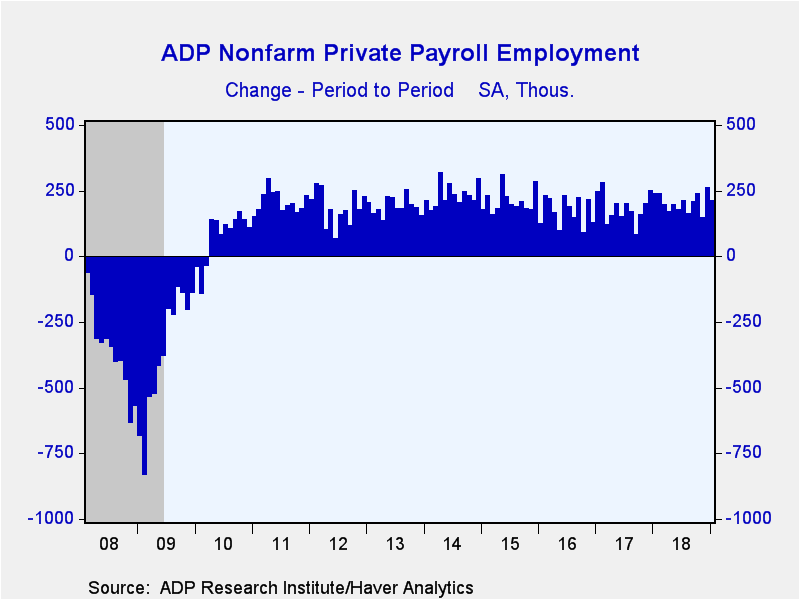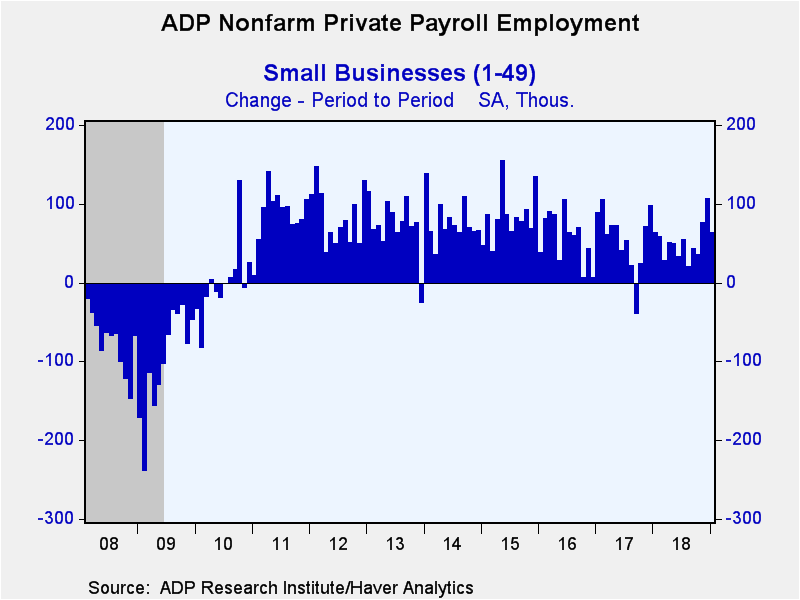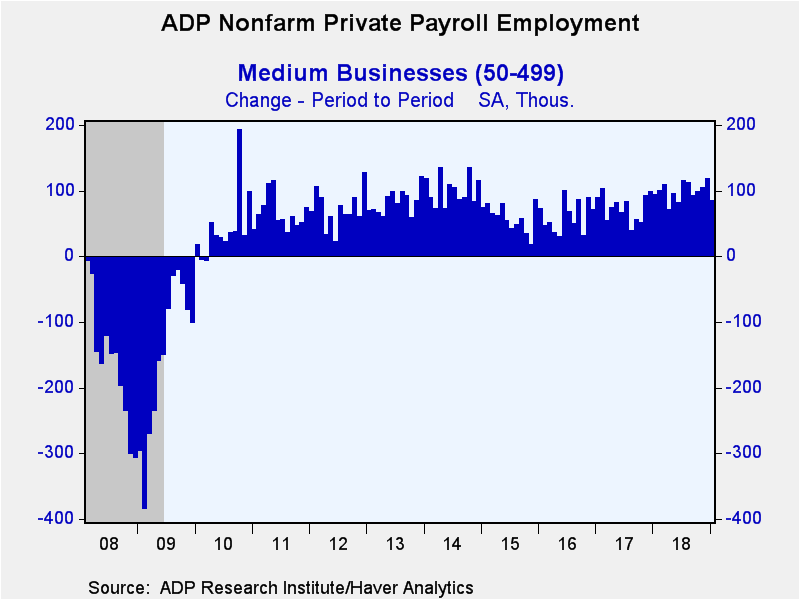 Global| Jan 30 2019
Global| Jan 30 2019U.S. ADP Private-Sector Payroll Growth Is Surprisingly Firm
by:Tom Moeller
|in:Economy in Brief
Summary
ADP indicated in its National Employment Report that private nonfarm payrolls increased 213,000 during January (1.9% y/y) following a 263,000 December gain, revised from 271,000. Expectations had been for a 175,000 rise in the Action [...]
ADP indicated in its National Employment Report that private nonfarm payrolls increased 213,000 during January (1.9% y/y) following a 263,000 December gain, revised from 271,000. Expectations had been for a 175,000 rise in the Action Economics Forecast Survey. The three-month average gain in payrolls was a fairly steady 208,000. During the last ten years, there has been a 94% correlation between the change in the ADP figure and the change in nonfarm private-sector payrolls as measured by the Bureau of Labor Statistics.
The ADP National Employment Report is calculated from ADP's business payroll transaction system covering 411,000 companies and nearly 24 million employees. The data is calibrated and aligned with the Bureau of Labor Statistics establishment survey data and is produced by the Automatic Data Processing Research Institute in collaboration Moody's Analytics Inc. The ADP data only cover private sector employment.
Small business payrolls strengthened 63,000 (1.2% y/y) following a 107,000 rise. The three-month average gain of 82,000 was improved from 33,000 as of October. Medium-sized payrolls gained 84,000 (2.6% y/y) and a steady 103,000 on a three-month basis. Large payrolls rose a strengthened 66,000 m/m (2.2% y/y) but by a greatly lessened 23,000, on average, during the last three months. This was the slowest three-month growth since May 2017.
Goods-producing payrolls increased 68,000 (2.4% y/y) in January. The three-month average gain picked up to 47,000, its quickest pace since last April. Construction sector payrolls rose 35,000 (3.0% y/y), strengthening the three-month average change to 25,000 from just 4,000 as of August. Manufacturing sector employment gained an improved 33,000 (1.9% y/y). The three-moth average rise improved slightly to 22,000. Natural resource and mining sector payrolls eased 1,000 (+6.3% y/y) and have been steady during the last three months. That compares to a 7,000 average last spring.
Private-service sector payrolls rose a lessened 145,000 (1.8% y/y). Three-month average growth was fairly constant at 161,000. Professional and business services payrolls improved a steady 46,000 (2.7% y/y). Jobs in education & health services rose a lessened 38,000 (2.1% y/y) following a December surge. Leisure & hospitality employment gained a steady 31,000 (1.9% y/y), while trade, transportation & utilities employment rose a greatly lessened 13,000 (1.3% y/y). Employment in the financial services sector strengthened 11,000 (1.5% y/y), and information sector employment grew a steady 4,000 (0.3% y/y).
The ADP National Employment Report data can be found in Haver's USECON database; historical figures date back to April 2001 for the total and industry breakdown, and back to January 2005 for the business size breakout. The expectation figure is available in Haver's AS1REPNA database.
The Effects of the Partial Shutdown Ending in January 2019 from the Congressional Budget Office is available here.
| ADP/Moody's National Employment Report | Jan | Dec | Nov | Jan Y/Y | 2018 | 2017 | 2016 |
|---|---|---|---|---|---|---|---|
| Nonfarm Private Payroll Employment (m/m chg, 000s) | 213 | 263 | 148 | 1.9% | 1.9% | 1.8% | 1.9% |
| Small Payroll (1-49) | 63 | 107 | 76 | 1.2 | 1.1 | 1.3 | 1.9 |
| Medium Payroll (50-499) | 84 | 119 | 105 | 2.6 | 2.3 | 1.9 | 1.5 |
| Large Payroll (>500) | 66 | 37 | -34 | 2.2 | 2.6 | 2.3 | 2.7 |
| Goods-Producing | 68 | 44 | 28 | 2.4 | 2.3 | 1.5 | 0.8 |
| Construction | 35 | 27 | 13 | 3.0 | 2.9 | 3.1 | 4.3 |
| Manufacturing | 33 | 17 | 16 | 1.9 | 1.7 | 0.7 | 0.2 |
| Service-Producing | 145 | 219 | 120 | 1.8 | 1.8 | 1.8 | 2.2 |
Tom Moeller
AuthorMore in Author Profile »Prior to joining Haver Analytics in 2000, Mr. Moeller worked as the Economist at Chancellor Capital Management from 1985 to 1999. There, he developed comprehensive economic forecasts and interpreted economic data for equity and fixed income portfolio managers. Also at Chancellor, Mr. Moeller worked as an equity analyst and was responsible for researching and rating companies in the economically sensitive automobile and housing industries for investment in Chancellor’s equity portfolio. Prior to joining Chancellor, Mr. Moeller was an Economist at Citibank from 1979 to 1984. He also analyzed pricing behavior in the metals industry for the Council on Wage and Price Stability in Washington, D.C. In 1999, Mr. Moeller received the award for most accurate forecast from the Forecasters' Club of New York. From 1990 to 1992 he was President of the New York Association for Business Economists. Mr. Moeller earned an M.B.A. in Finance from Fordham University, where he graduated in 1987. He holds a Bachelor of Arts in Economics from George Washington University.
More Economy in Brief
 Global| Feb 05 2026
Global| Feb 05 2026Charts of the Week: Balanced Policy, Resilient Data and AI Narratives
by:Andrew Cates










